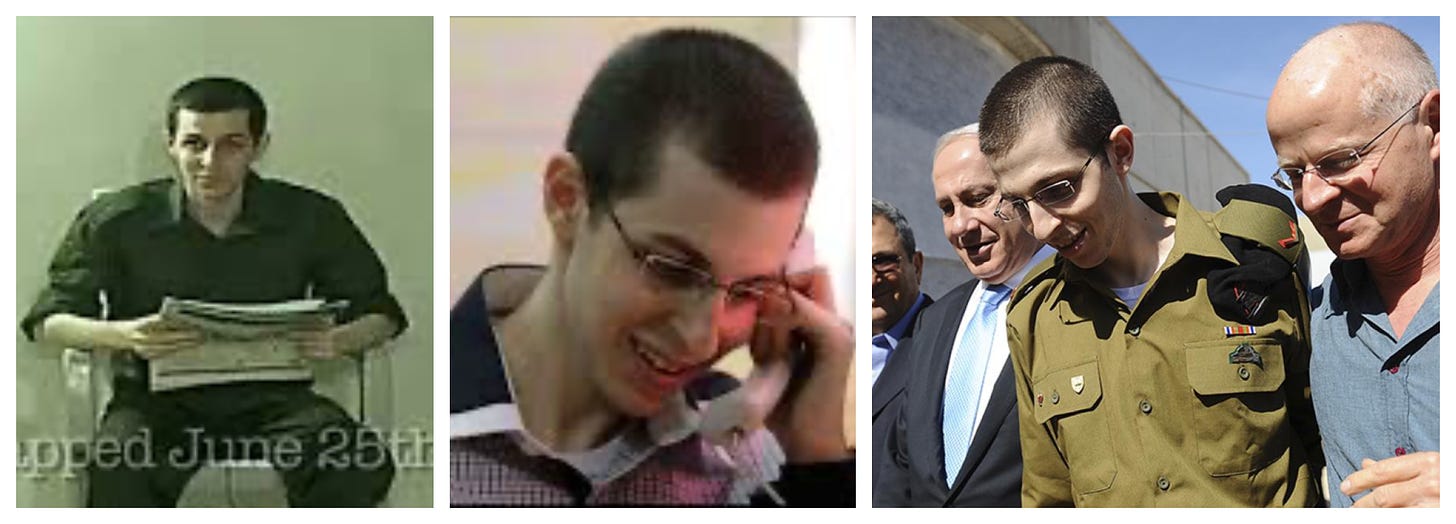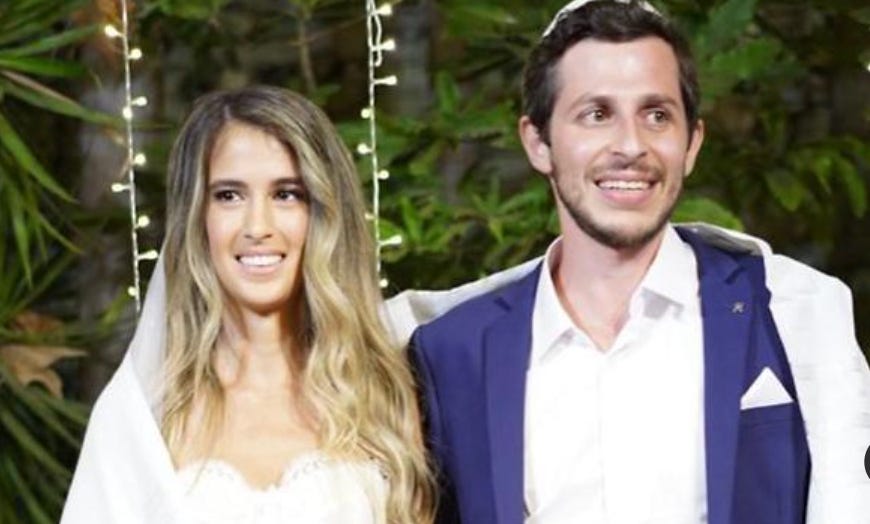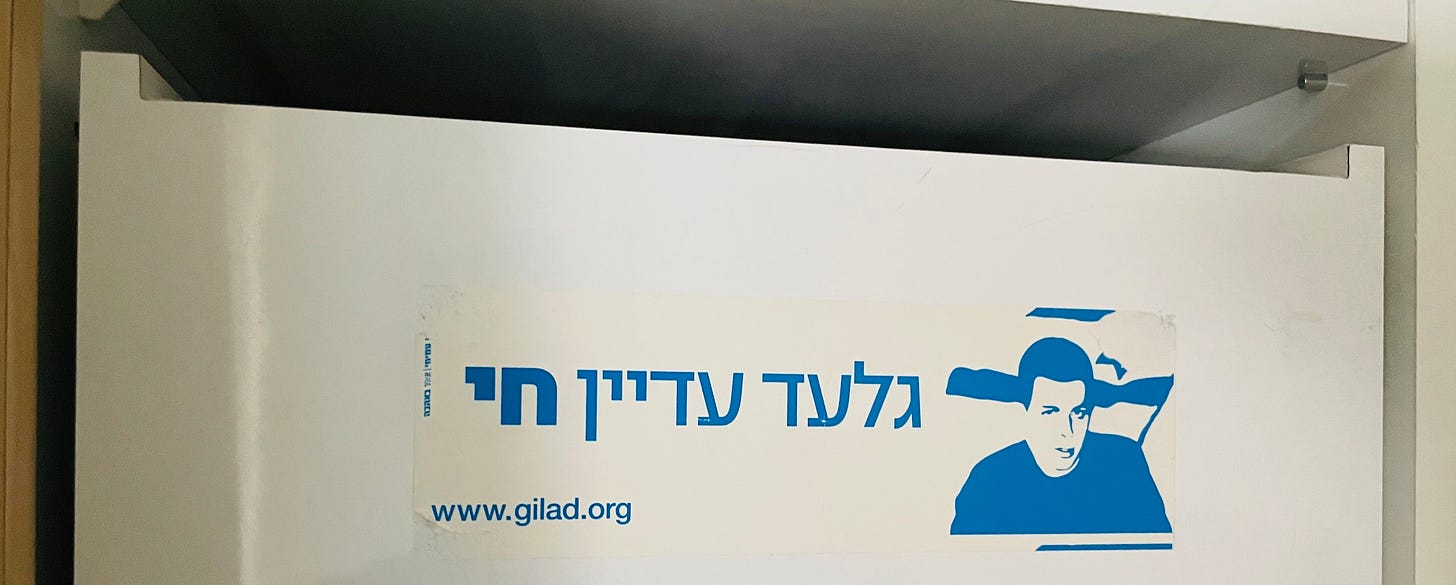
Discover more from Israel from the Inside with Daniel Gordis
"He's the son of all of us ..."
What Israel's reaction to Gilad Shalit's getting married says about this place
A decade ago, perhaps a bit more, I dropped by our local makolet (an Israeli institution- a tiny neighborhood grocery store) early in the morning. The makolet stacks the newspapers for sale outside the front door, so you can’t help taking a look at the headlines as you head in.
That morning, the lead story was about Ron Arad, the IAF navigator shot down over Lebanon and taken prisoner in October 1986 and about whose fate Israel has never gotten any solid information. A new source had surfaced, the paper reported, according to whom Arad had tried to escape in 1988, had been re-captured and tortured to death. There were some hints at what might have been done to him, all too gruesome to repeat here.
I grabbed what I needed and headed to the cash register, which happens to be adjacent to the door. As I waited, I heard the strangest sound, and looked outside. There was a woman standing there, her hand to her face, covering what was now a visible gasp. Her face was wracked with horror. She had obviously read the article, too.
That image of that woman has stayed with me all these years.
But I hadn’t thought of her, whoever she was, in a long time. Until earlier this week, when Israeli news reported that Gilad Shalit (the Israeli soldier captured by Hamas in a 2006 cross-border raid and then held in captivity for five years) had just gotten married, some ten years after his release.
Gilad Shalit’s getting married might not seem like an event worth noting; it is, though, because of how the country reacted, and what that reaction tells us about this place.
The headline (example immediately above) about Shalit’s having gotten married was classic Israeli. Ha-yeled shel kulanu, it read, “He’s the son of all of us” [bad English, but there’s no good way to render the Hebrew]. Then it continues: “Gilad Shalit married Nitzan Shabbat.”
Ha-yeled shel kulanu was what got me to remember that woman with the gasp outside the makolet. Ron Arad, Gilad Shalit, and too many others—this is a place where you actually have kids you’ve never met.
Zechariah Baumel was one of several soldiers taken prisoner when their unit was attacked in the battle of Sultan Yakub in June 1982. For years, Israel knew virtually nothing about his fate. Baumel’s father, Yona, devoted the rest of his life to pressing Israel to do more to get information, and as part of this many-years-long campaign, he ended up speaking to the middle school class of one of our sons.
Our son came home, and over dinner, told us about Baumel’s presentation. During the Q&A portion, he told us, one of his classmates asked Baumel if he worried that Zechariah was still being tortured. I grimaced; middle school kids don’t yet know what you don’t ask. But I didn’t say anything, and our son continued. “No,” Yona Baumel told the kids, “I don’t worry that they’re torturing him. I just worry that he’s cold at night.”
It was silent at our dinner table.
That night, when we got into bed, I was pulling the blankets over me, and stopped. It all came back—the imagine of the father speaking to our kid, the father’s image of his son cold without a blanket, my son’s pained face as he’d told us about school. There was no way I was going to fall asleep; I got out of bed and read for a few hours. Even when I went back to bed, I actually felt guilty pulling the covers up.
It’s customary in many synagogues throughout the world to recite, somewhere in the middle of the reading of the Torah on Shabbat morning, a mi shebeirach, a prayer for those who are ill. In Israel, in many synagogues, it is also customary to add a similar one for Israeli prisoners of war, praying for their return. The list is not long, thankfully, so after hearing it week after week after week, year after year, you know the list by heart. In the early years of the previous decade, it included, among others, Zechariah Baumel, Ron Arad, and Gilad Shalit.
In 2003, the IDF declared Baumel dead. (His father died in 2009; in 2019, Vladimir Putin coordinated a deal in which Zechariah’s remains were brought to Israel for burial.) His parents objected to the IDF’s decision, but the army insisted that it had reason to believe Baumel had died in captivity. The next Shabbat, the person reciting the mi shebeirach omitted Baumel’s name. It was horribly jarring; it felt as if something had been ripped out.
As if on cue, an argument erupted. “What are you doing?” someone yelled, horrified that we’d “given up” on getting Baumel back. Someone else retorted that the person was only following what the army had declared. The dispute died down after a few moments, but it had gotten quite heated. Though I recall the argument, I no longer remember what was decided. What I do remember is the intensity of the feelings in the room, all about a person none of us had ever met. He was almost certainly dead—that much, we all knew. But there were those who were adamant that his name not be dropped because giving up hope was too painful.
Baumel, as the news had said of Shalit earlier this week, was ha-yeled shel kulanu.

Shortly after Gilad Shalit was captured, the weekend paper arrived with an insert—a prayer it asked women to recite on Friday afternoons when they lit Shabbat candles, a prayer for Shalit’s safe return. My wife saw the insert, put it on the breakfront where we keep the candlesticks, and began, week after week, to read it as she lit candles. We had boys around army-age back then, so any mention of Gilad Shalit was not only heartbreaking—it was also terrifying. What had happened to him could happen to others, we and all our friends with kids the same age knew.
So I got used to seeing, Friday after Friday after Friday, every week for five years, when she finished lighting candles before Shabbat, Elisheva’s eyes slightly red. We never, ever spoke about it; the thought was too horrifying to utter aloud. But with Shalit in captivity, and our boys at the age that they were, Shalit’s fate and the terror it evoked became part of our family’s unspoken Shabbat ritual.
Ha-yeled shel kulanu.
The prisoner exchange that Israel made for Gilad Shalit (who was born six weeks before Ron Arad was shot down) was highly controversial in Israel. Israel traded 1,027 prisoners for Shalit, many of them “with blood on their hands” (an Israeli idiom meaning that they themselves had murdered Israelis). The hard core terrorists among them, vehement critics of the deal said, would kill Israelis again, and sure enough, some did.
I was personally in favor of the deal, both as it was being negotiated and publicly debated in Israel, and as it unfolded. I understood my friends who thought it was a terrible mistake, but I disagreed with them. What makes Israel into Israel, I believed then and still do, is that we get those boys home, no matter what.
[The helicopter pilot who brought Gilad Shalit home was the son of Yishai Aviram, the pilot of the plane in which Ron Arad had been the navigator when they were shot down; Aviram was rescued by an Israeli helicopter a few hours after they were shot down and escaped by clinging to its landing skids while under heavy enemy fire, but Arad was captured by Lebanese terrorists. Aviram’s son insisted that he be the one to bring Shalit back home.]
What makes Israeli society what it is, is that there was no one in Israel who did not know who Gilad Shalit was. There was no one who did not think about him.
That’s not only who we are, it’s why we are.
Not long ago, desperate for some additional closet space, I went to put some clothes in a closet in the bedroom that had once been our son’s. I slid open the door to the closet, and then, right in front of me, was a bumper sticker he’d affixed to one of the drawers—"Gilad is still alive” it reads.
Gilad has now been home for a decade. And our sons have been out of the house for about as long. No need for the sticker, I thought, and I almost peeled it off.
But then I left it there—something about remembering those agonizing years of uncertainty his fate felt sacred.
Ha-yeled shel kulanu.
So Shalit’s wedding (you can watch a brief clip of it here, on an Israeli news site) became a bit of a short-lived national story this week. As well it should have. Both the “national” and the “short-lived.” National because we did the right thing bringing him home. Short-lived because he deserves his normal life.
He deserved to come home, and he deserves to live however he wants. He deserves, in short, precisely what we’d want for any of our kids.
After all, as the headline correctly noted, he’s ha-yeled shel kulanu.
Sapir Ganz Eldar is a student at Shalem College, where I work. She comes from a settlement over the green line, is Orthodox, went to an all-girls religious high school, her father was opposed to her serving in the army (he wanted her to do National Service).... So we think we get the picture, right?
Yet we don't, because the picture is always more complicated. Sapir did join the army, over her parents' objections, and once an officer, created a program to assist Israeli Arab soldiers.
"Israeli Arab soldiers"? That, too, might sound surprising. Here's a brief excerpt of my conversation with Sapir. The full conversation was posted last week, and is available to subscribers at danielgordis.substack.com.
Coming up later this week, a podcast on the often untold — and painful — story of Israel’s veterans who desperately need help, and too often get lost in the system. That, too, will be sent to subscribers in a few days.
Nice news this week that Israel from the Inside was selected as a Featured Substack Publication. (For this week only, see substack.com/home.)
Our twitter feed is here; feel free to join there, too.
Subscribe to Israel from the Inside with Daniel Gordis
Israel from the Inside is for people who want to understand Israel with nuance, who believe that Israel is neither hopelessly flawed and illegitimate, nor beyond critique. If thoughtful analysis of Israel and its people interests you, welcome!










